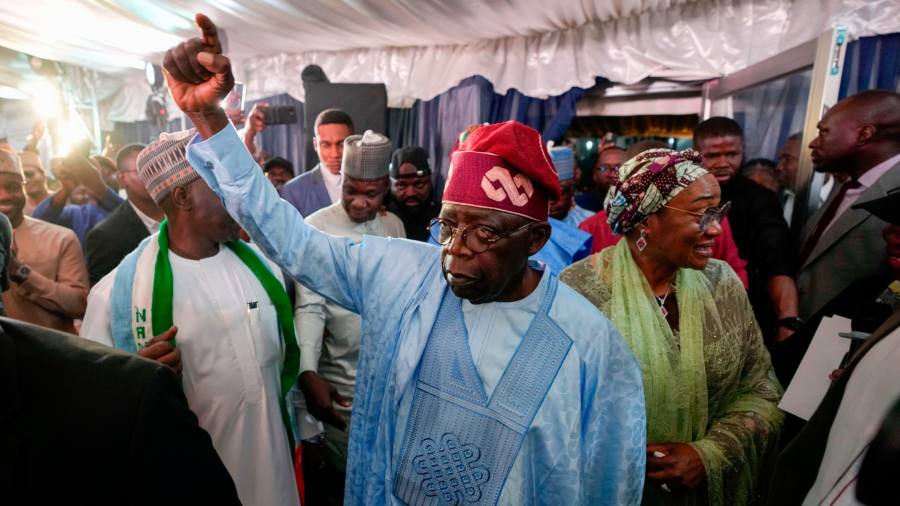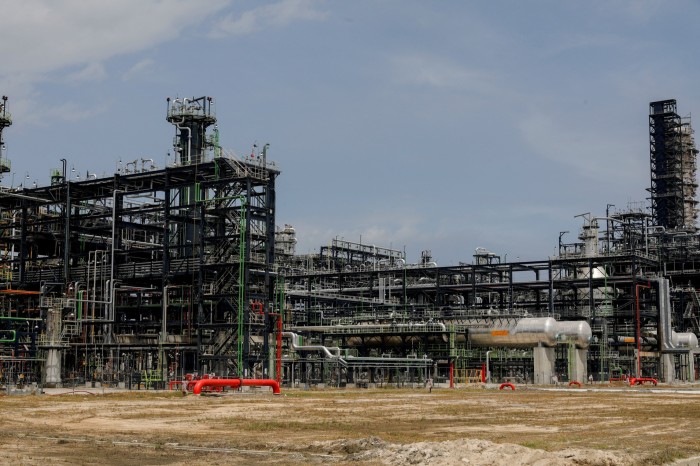
Nigerians have long harboured a robust scepticism towards their leaders. Now they have gone one better. Many doubt that the man sworn in as president this week is their leader at all.
In an open letter to US president Joe Biden, Chimamanda Adichie, the feted author, spoke for millions when she cast doubt on the result of February’s presidential election in which Bola Tinubu was declared winner. Adichie castigated the Americans for endorsing the result.
There is no proof that the election was stolen — or bought. But there are plenty of grounds to suspect a result that is being challenged in court by the defeated candidates.
Election day, far from being the clean, digitally assisted process promised, was an exercise in chaos. Many polling booths opened late, voter intimidation was rife and tallies were not uploaded, creating wriggle room for fraud. When a Financial Times reporter visited a polling station in Surulere, Lagos, armed men made off with the presidential ballot box.
The biggest red flag was turnout. There was buzz about an election being contested by three credible candidates rather than the usual brace. Some 87.3mn of 93.5mn registered voters went through the rigmarole of obtaining the necessary permanent voter cards. Yet official figures say only 27 per cent of those bothered to show up. The suspicion is that millions were either stopped from voting or their votes simply not counted.
In the end, Tinubu clinched victory with 8.8mn votes, a paltry result in a country of 220mn. Yet in an election in which many assume key officials were bought off, few expect the courts to annul the result.
That means Tinubu, whether Nigeria’s most famous living novelist likes it or not, will be president for the next four years. Assuming he survives that long. Such is the suspicion about him that many even doubt his official age of 71.
Visibly ill, lacking a strong mandate and in charge of a country teetering on the edge, Tinubu appears to have little going for him. But after eight years of Muhammadu Buhari, under whose directionless presidency Nigeria got poorer and less secure, he actually has one ace up his sleeve. Expectations are so low it would take a concerted effort to underwhelm.
Indeed, there are several possible quick wins. The first is his power of appointment. When he was governor of Lagos from 1999-2007, a period of palpable progress in Nigeria’s throbbing commercial capital, Tinubu appointed a team of savvy technocrats. As president, if he can name competent people to key positions, he will have already cleared an important bar.
As well as cabinet members, his appointment for central bank governor will be key. Nigeria’s multiple exchange rates are a mess and an invitation to corruption. They ward off foreign investors who fear the naira has further to plunge and doubt they can obtain foreign exchange at realistic rates. Sorting out this mess could lure billions of dollars of investment.
Likewise, moderately sensible management of the oil sector could perform miracles. The first task is to stop theft. Of Nigeria’s 1.8mn barrels a day Opec quota, an incredible third vanishes each year due to theft and loss. If the owner of a corner shop lost a quarter of their stock to shoplifters every time they opened, they would soon be out of business. Tinubu must get a grip.

The government has been also paying nearly $1bn a month on fuel subsidies, crippling its finances and limiting its capacity to spend on schools, hospitals or roads. The subsidy is a licence for middlemen to smuggle and cheat. In his inauguration speech, Tinubu said the subsidy was “gone”, causing prices to leap.
The last time Nigeria’s government tried to end the fuel subsidy in 2012, there were nationwide riots followed by a hasty retreat. But the poor, in whose name the subsidy is enacted, are actually victims of a system that transfers wealth to the petrol-guzzling middle class. If Tinubu sticks to his guns and spends the money on public services instead, he can help restore both fiscal and political credibility.
This is a lot to ask of a man who, though in some ways an effective governor of Lagos, has appeared to epitomise all that is wrong with Nigeria’s governing class. As Adichie points out in her letter to Biden, in 1993 Tinubu forfeited $460,000 to the US government after a Chicago court determined that he had benefited from drug trafficking.
Tinubu has strongly denied that and all other allegations of corruption. This is the lowest bar of all. If he runs a moderately clean government, who knows how many minds he can change.